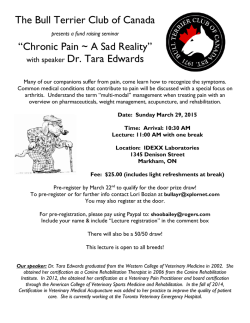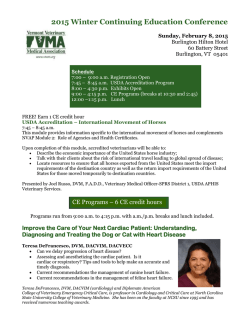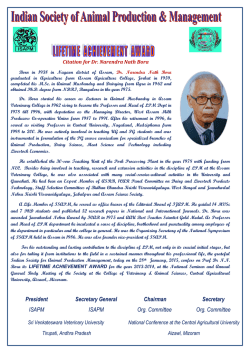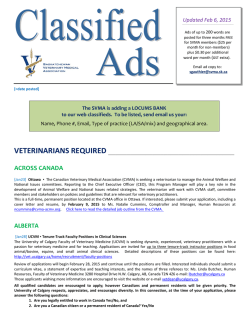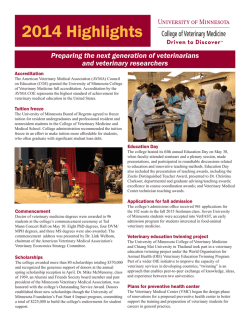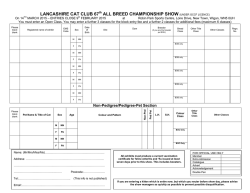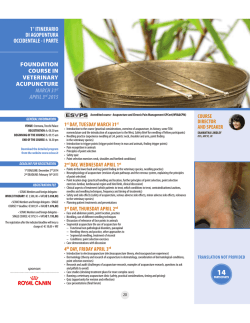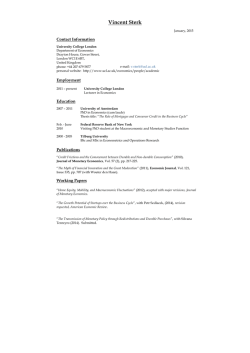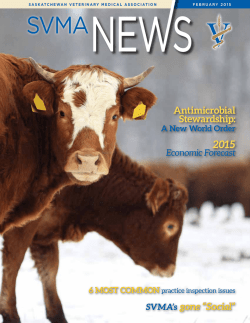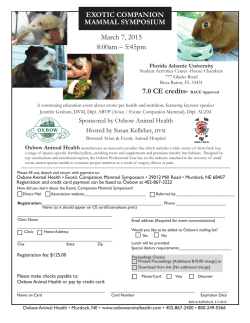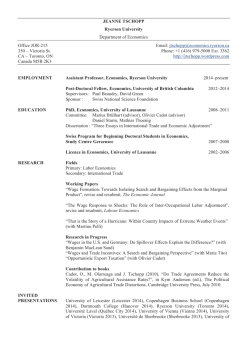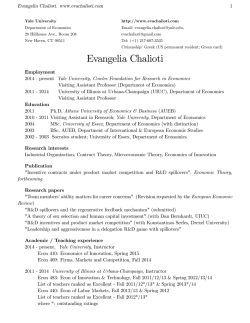
NEWSLETTER | JANUARY 2015 five pages KEYNOTE
14th International Symposium of Veterinary Epidemiology and Economics Veterinary Epidemiology and Economics: Planning Our Future NEWSLETTER | JANUARY 2015 five pages Dear ISVEE Delegates - Greetings from Merida, Yucatan, MEXICO, and Happy 2015! In this issue, we present our keynote speakers. KEYNOTE SPEAKERS Topic: One Health Alfredo Dájer, President of the Organizing Committee of ISVEE 14. Jonna MAZET, DVM, MPVM, PhD, is a professor of epidemiology and disease ecology and director of the One Health Institute in the UC Davis School of Veterinary Medicine where she focuses on global health problem solving, especially for emerging infectious disease and conservation challenges. Dr. Mazet is active in international One Health research programs, especially disease transmission among wildlife, domestic animals, and people and the ecological drivers for disease emergence. Currently, she is the Global Director of a $175 million viral emergence early warning project, named PREDICT, that has been developed with the US Agency for International Development’s Emerging Pandemic Threats Program. She has recently been elected to the National Academies’ Institute of Medicine in recognition of her successful and innovative approach to emerging environmental and global health threats. 1 Topic: Climate Change James HANSEN, BA, MSc, PhD, formerly Director of the NASA Goddard Institute for Space Studies, is an Adjunct Professor at Columbia University’s Earth Institute, where he directs a program in Climate Science, Awareness and Solutions. He was trained in physics and astronomy in the space science program of Dr. James Van Allen at the University of Iowa. His early research on the clouds of Venus helped identify their composition as sulfuric acid. Since the late 1970s, he has focused his research on Earth's climate, especially human-made climate change. Dr. Hansen is best known for his testimony on climate change to congressional committees in the 1980s that helped raise broad awareness of the global warming issue. He was elected to the National Academy of Sciences in 1995 and was designated by Time Magazine in 2006 as one of the 100 most influential people on Earth. He has received numerous awards including the Carl-Gustaf Rossby and Roger Revelle Research Medals, the Sophie Prize and the Blue Planet Prize. Dr. Hansen is recognized for speaking truth to power, for identifying ineffectual policies as greenwash, and for outlining actions that the public must take to protect the future of young people and other life on our planet. 2 Topic: Epidemiology and Animal Health Economics Jonathan RUSHTON PhD, MAgSci, MA is an agricultural economist who specialises in the economics of animal health and livestock production and food systems – interests that grew from living and working on the family dairy farm. He is involved in research in the UK and Europe, and has extensive international experience of livestock production and the control of animal diseases in South America, Africa and Asia. During the global avian influenza response he worked at the Food and Agriculture Organization of the United Nations (FAO). His recent research focus has been on the use of economics in understanding the emergence of pathogens from food systems and the more general impacts of disease at individual level and across society. This focus embraces the need for One Health approaches in the search for solutions to society’s disease and wider health problems. He is currently the professor in animal health economics at the Royal Veterinary College, holds the Norbrook endowed chair on veterinary business management, is a member of the Leverhulme Centre for Integrative Research on Agriculture and Health and a non-executive member of the Animal Health and Welfare Board for England. 3 Topic: Epidemiology and National Veterinary Services (Team presentation by Drs. Cristóbal Zepeda and Vitor Gonçalves). Cristóbal ZEPEDA, MVZ, MSc, PhD is a veterinary epidemiologist specializing in risk analysis and international animal health policy. He is the Veterinary Attaché for USDA-APHIS in Mexico City. Previously, he worked with the Animal Population Health Institute at Colorado State University and USDA’s Centers for Epidemiology and Animal Health (CEAH), where he was responsible for coordinating the activities of CEAH as a World Organization for Animal Health (OIE) Collaborating Center. Through his work with the OIE he contributed to the development of several international standards. During his career, Cristóbal has visited more than 60 countries in all continents training several hundred veterinarians in epidemiological methods applied to disease control programs. He has also participated in official review teams to assess the animal health status and veterinary services in several countries and contributed to bilateral negotiations on the application of sanitary measures. He has extensive international experience having lived and worked in Mexico, Haiti, Jamaica, Scotland, Central America and the United States. He is a passionate photographer and mountain biker. 4 Topic: Epidemiology and National Veterinary Services (Team presentation by Drs. Cristóbal Zepeda and Vitor Gonçalves). Vitor GONCALVES, DVM, PhD, is a veterinary epidemiologist specialized in planning of animal health public policy. He worked in animal health projects in Brazil, Africa and Europe. He is currently an Associate Professor at the University of Brasília, where he coordinates the veterinary epidemiology laboratory (EpiPlan) and lectures on quantitative methods as well as disease surveillance and control. Over the last 15 years, he has established longstanding collaborations with public animal health administrations in Brazil, both for terrestrial and aquatic animals. He has extensive experience in bridging the gap between the national veterinary services and the role of universities with regard to applied research and training in veterinary epidemiology. His research interests are focused on methods for surveillance of endemic and major trade diseases. He has collaborated regularly with the OIE, participating in ad-hoc groups, notably on epidemiology and commodity-based trade. He is a member of the Editorial Board of Preventive Veterinary Medicine. Topic: Animal Welfare (Keynote Speaker: To Be Announced). 5
© Copyright 2026
